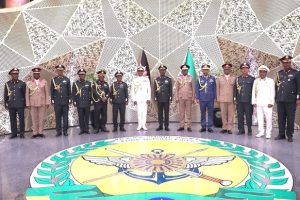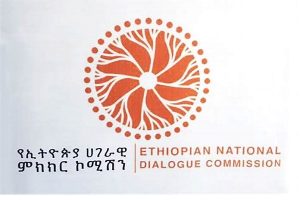
BY ADDISALEM MULA
T The Pretoria peace pact is not only about ending the conflict but is also about ensuring permanent cessation of hostilities too. In fact, long before the signing of the deal, the federal government since the onset of the conflict has been coming up with useful approaches to get to the bottom of the problem in an atmosphere of calm. The breach of the constitutional order and unlawful conducts are what led to the outbreak of the devastating war in the country.
In this regard, the parties two the accord have agreed to restore constitutional order and ensure rule of law there by ensuring permanent cessation of hostilities. The cessation of hostilities agreement that has been signed between the federal government and the Tigray People’s Liberation Front (TPLF) has been playing an extremely important role in clearing the way for peace implementation. The whole thing on the subject of peace implementation has been developing in the right direction. One of the linchpins of the deal is restoring constitutional order in Tigray.
The agreement stipulates that the Ethiopian federal government must be allowed to reestablish authority in the Tigray Region, including in the capital of Mekelle, and that “the ENDF and other relevant Federal Institutions shall have an expeditious, smooth, peaceful and coordinated entry” into the capital. Pretoria’s agreement in this regard accentuates the need to respect the demarcation of authorities and return the Tigray state to constitutional order.
Translating this agreed term into action lays the ground for permanent cessation of hostilities and allows the full functioning of the country’s essential institutions. Also in the AU-brokered peace deal is the disarmament, demobilizing, and reintegration of the Tigray Defense Force. This agreement corroborates that there should not be two equal armies in one nation. This undisputedly rectifies the past mistake and addresses one of the major bones of contentions. And, the effective implementation of the term is also about maintaining peace and order.
In the present climate, the wider international community has been expressing admiration for the positive achievements surfacing in every corner of the Tigray state. In good truth, after the African Union (AU) brokered the peace deal, peace implementation has been in full operation. “We must build a country that is suitable for the future generation by breaking the vicious cycle of conflict and war,” the Ethiopian scientist Haregwein Assefa said. She emphasizes that Ethiopians need to get out of the vicious circle of war and conflict and rebuild a country suitable for future generations.
The peace agreement reached to resolve the problem in northern Ethiopia peacefully is an important step for lasting peace, the professor noted. Born around Adwa of Tigray region, Professor Haregewein Assefa is a senior scientist in drug research who has filed for several patents to protect her inventions with fellow counterparts. In an exclusive interview with Ethiopian News Agency, she underscored the importance of only peaceful dialogue in the country. According to the professor, peace is the only option to bring development and progress.
Therefore, everyone should give priority to peace and work since there is no substitute for peace. She believes that, it is appropriate to teach the generation about unity rather than differences. Hence, we Ethiopians must get out of the vicious circle of war and conflict and build a country that is suitable for future generations. “Peace emanates from working together, unity, and love. Especially in the 21st century, fighting must be avoided. Guns do not solve problems. If we start talking about love and unity instead, we can solve problems. Through education, we can solve every problem. If we tell our students that guns kill, that is enough as everything starts at home.”
The professor noted that it is necessary to inculcate patriotism, empathy and unity and build a country suitable for all citizens. In order to lift citizens out of poverty, ensuring development and lasting peace should be a job that cannot be left for tomorrow, she stressed. “There is no greater legacy than peace to the coming generation. Thus it is crucial that we build peace for the next generation. Now I have added five years to my age. But, if I don’t live in peace, living 10 years is meaningless. What is the legacy I am leaving to contribute to peace?” Professor Haregewein further said “when I think about what I will leave for my children, peace takes the first place. If there is peace, we will get out of trouble.
We will not be beggars.” For her, the peace agreement has a special meaning and all should support it. Recall that following the Pretoria Peace Agreement, the Government of Ethiopia has been restoring basic services, providing humanitarian aid widely and rebuilding destroyed infrastructures. Publishing commentaries on the CoHA, Prof. Ann M. Fitz-Gerald and Hugh Segal (Ph.D.) also stated that, the beginning of this new era has to earn the ongoing support of the people, parties and international actors and be reinforced by other important reform initiatives to address clear sources of insecurity in Ethiopia.
They also said: ‘‘The settlement agreed by the parties to Ethiopia’s conflict offers hope for lasting peace, but further steps are still needed to deter future violence and instability. Failing on these measures of support opens a risk that the recently brokered peace agreement will simply be an instance of kicking the can down the road.’’ As to the authors, the government has to now push various reforms forward in earnest to build a plural democratic governance model in Tigray so as to lead a stable foundation in place for peace to move forward and rebuild the conflict-affected areas of Tigray, Amhara and Afar.
“It is also important to well discuss the contested areas elsewhere in the country and other ill-defined or ambiguous land issues to properly run security and economic reforms. The momentum behind capital market reforms including the proposed launch of the Ethiopia stock exchange, which could accelerate economic growth and opportunities in a more publicly accountable private sector, have to be focused on,’’ they underlined.
They also recommended that, the commitment and resources required to support the monumental reform exercise envisioned in the text of the peace agreement should not be underestimated; nor should the requirement to end a largely disinformation-based war. “The sustained support such as robust and accountable AU monitoring and verification capability and access for independent reporting and commitment of the Ethiopian people, the political parties, Ethiopian Diaspora groups and international actors is required and priority should be given,” they remarked.
Translating this agreed term of the peace deal into action lays the ground for permanent cessation of hostilities and allows the full functioning of the country’s essential institutions. On the other side, the federal government would guarantee the Tigray people be properly represented in federal government institutions in line with the constitution. Respecting this part of the deal will surely help restore full order in the country and smoothens the flourishing of the federal democratic state in the country. Moreover, as clearly indicated in the peace accord, the election held in Tigray is void and null. This vividly demonstrates that the implementation of the constitution should be equally applicable to all and all the time.
The Ethiopian Herald January 12/2023



